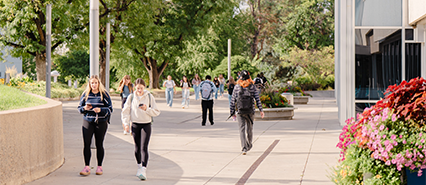Acquisitions and Collection Development Policy
The primary focus of the library collection is to support the undergraduate and graduate curriculum of the University. The secondary focus is to support faculty research. As funds allow, materials will also be purchased as suggested by the general campus community.
We develop the collection using the following guidelines:
- The library faculty (hereafter referred to as liaisons) will request input from departmental faculty regarding appropriate purchases for the library collection. However, the liaisons are responsible for collection development and therefore will make all final decisions.
- Duplicate purchasing is an exception and is not a normal procedure.
- Journals will be obtained in electronic format whenever possible. When online access to a journal is available through another library subscription, the print journal will not normally be purchased.
- Textbooks, manuals and workbooks are not generally considered for purchase.
- Rare books are generally acquired through donations and gifts; however the Archives and Special Collections Department may consider developing special collections that support the curriculum.
- Out of print materials can be acquired only with the approval of a liaison.
- Specialized and expensive materials will only be purchased after other area library holdings are consulted to avoid duplication.
- The Library will not buy (or accept donations of) mass market paperback editions of books because they are cheaply made and the paper contains acid. This makes them unsuitable for preservation and long-term use. The Library will only buy (or accept) mass markets if extenuating circumstances exist, such as no other format being available or a special request from faculty.
- Purchases and donations of titles from vanity presses or fine press publishers are not normal procedure and will be considered by liaisons on a case-by-case basis.
- When resources are available in multiple formats, such as both print and electronic, the Acquisitions Department will generally order the format that was requested by the liaison. In some instances (such as when a resource will be used by multiple students in a single semester or when there is a difference in price between the formats), the Acquisitions Department will elect the optimal format for the department’s needs, in consultation with liaison. However, the CSU-Pueblo Library does not have an official preference for one format over the other.
- On occasion a purchase request comes to Acquisitions when the library already owns the book in a format other than what was requested, or the library has access to the ebook format through our Demand-Driven Acquisitions program. Rather than automatically duplicating the purchase in the new format, Acquisitions will consult the liaison to confirm whether duplication is necessary and/or wanted at that time. Liaisons will also determine whether to purchase the DDA titles with allocation funds or leave access available but without initiating a purchase of the book(s).
Suggested Purchases
Faculty may submit monograph, A/V and other requests to the liaison assigned to their department. We do not accept unsolicited items for review that are accompanied by an invoice, bill or request for payment. We will not return unsolicited items sent to us without return postage included.
Discarding Policy
Discarding (or “weeding”) is an integral part of maintaining a healthy library collection. The Acquisitions staff, in consultation with the liaisons, who are familiar with each department’s curriculum and faculty research areas, supports weeding of the Library’s collections.
Badly damaged copies of print materials are reevaluated and removed, repaired, rebound or reordered as determined by the Acquisitions Department and the liaisons.
Titles with low use and obsolete information are routinely withdrawn from the collection. Items selected for weeding are donated to No Store, a project developed by the Colorado Library Consortium that resells, reuses, or donates the books. Books donated to the archives or the general collections that are not selected for inclusion are also sent to No Store. Items that No Store will not accept will be disposed of according to university and State of Colorado policies and procedures for surplus materials. From the Library Purchasing Manual:
“The Director of Purchasing authorizes the Library to dispose of surplus books, periodicals, etc., according to practices of the trade. In general, the Library will try to offer these materials to other libraries and public agencies. When the materials are of little or no value to other agencies, the Library may decide to offer these free on a first come, first serve basis, by placing the books in public areas of the Library for disposal to the public. Materials purchased with non-government funds or without other restrictions may be sold in a book sale. If materials are in extremely poor condition or judged to be of no interest as free materials, the material may be discarded. The Library Acquisitions Department maintains records of the numbers of materials that are disposed of by the above processes.”
Departmental Allocations
Departmental allocations are for intentional purchases of individual books, DVD’s, CD’s, etc. regardless of format. This includes individual books (or multivolume sets of books), ebooks, DVD’s, CD’s, or streaming videos. Allocations are not normally used for packages of books or packages of ebooks, databases, or journals, etc.
Approved 8/2015 RGEdited 8/2018 KTP

